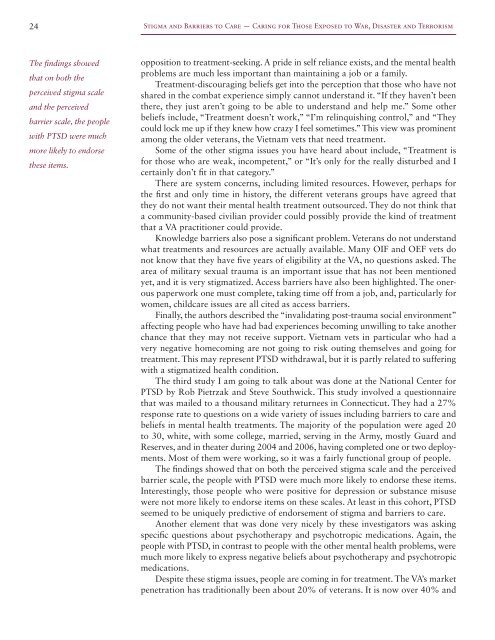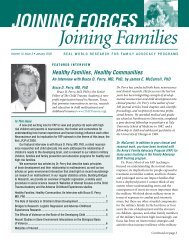stigma and barriers to care - Uniformed Services University of the ...
stigma and barriers to care - Uniformed Services University of the ...
stigma and barriers to care - Uniformed Services University of the ...
You also want an ePaper? Increase the reach of your titles
YUMPU automatically turns print PDFs into web optimized ePapers that Google loves.
24<br />
Stigma <strong>and</strong> Barriers <strong>to</strong> Care — Caring for Those Exposed <strong>to</strong> War, Disaster <strong>and</strong> Terrorism<br />
The findings showed<br />
that on both <strong>the</strong><br />
perceived <strong>stigma</strong> scale<br />
<strong>and</strong> <strong>the</strong> perceived<br />
barrier scale, <strong>the</strong> people<br />
with PTSD were much<br />
more likely <strong>to</strong> endorse<br />
<strong>the</strong>se items.<br />
opposition <strong>to</strong> treatment-seeking. A pride in self reliance exists, <strong>and</strong> <strong>the</strong> mental health<br />
problems are much less important than maintaining a job or a family.<br />
Treatment-discouraging beliefs get in<strong>to</strong> <strong>the</strong> perception that those who have not<br />
shared in <strong>the</strong> combat experience simply cannot underst<strong>and</strong> it. “If <strong>the</strong>y haven’t been<br />
<strong>the</strong>re, <strong>the</strong>y just aren’t going <strong>to</strong> be able <strong>to</strong> underst<strong>and</strong> <strong>and</strong> help me.” Some o<strong>the</strong>r<br />
beliefs include, “Treatment doesn’t work,” “I’m relinquishing control,” <strong>and</strong> “They<br />
could lock me up if <strong>the</strong>y knew how crazy I feel sometimes.” This view was prominent<br />
among <strong>the</strong> older veterans, <strong>the</strong> Vietnam vets that need treatment.<br />
Some <strong>of</strong> <strong>the</strong> o<strong>the</strong>r <strong>stigma</strong> issues you have heard about include, “Treatment is<br />
for those who are weak, incompetent,” or “It’s only for <strong>the</strong> really disturbed <strong>and</strong> I<br />
certainly don’t fit in that category.”<br />
There are system concerns, including limited resources. However, perhaps for<br />
<strong>the</strong> first <strong>and</strong> only time in his<strong>to</strong>ry, <strong>the</strong> different veterans groups have agreed that<br />
<strong>the</strong>y do not want <strong>the</strong>ir mental health treatment outsourced. They do not think that<br />
a community-based civilian provider could possibly provide <strong>the</strong> kind <strong>of</strong> treatment<br />
that a VA practitioner could provide.<br />
Knowledge <strong>barriers</strong> also pose a significant problem. Veterans do not underst<strong>and</strong><br />
what treatments <strong>and</strong> resources are actually available. Many OIF <strong>and</strong> OEF vets do<br />
not know that <strong>the</strong>y have five years <strong>of</strong> eligibility at <strong>the</strong> VA, no questions asked. The<br />
area <strong>of</strong> military sexual trauma is an important issue that has not been mentioned<br />
yet, <strong>and</strong> it is very <strong>stigma</strong>tized. Access <strong>barriers</strong> have also been highlighted. The onerous<br />
paperwork one must complete, taking time <strong>of</strong>f from a job, <strong>and</strong>, particularly for<br />
women, child<strong>care</strong> issues are all cited as access <strong>barriers</strong>.<br />
Finally, <strong>the</strong> authors described <strong>the</strong> “invalidating post-trauma social environment”<br />
affecting people who have had bad experiences becoming unwilling <strong>to</strong> take ano<strong>the</strong>r<br />
chance that <strong>the</strong>y may not receive support. Vietnam vets in particular who had a<br />
very negative homecoming are not going <strong>to</strong> risk outing <strong>the</strong>mselves <strong>and</strong> going for<br />
treatment. This may represent PTSD withdrawal, but it is partly related <strong>to</strong> suffering<br />
with a <strong>stigma</strong>tized health condition.<br />
The third study I am going <strong>to</strong> talk about was done at <strong>the</strong> National Center for<br />
PTSD by Rob Pietrzak <strong>and</strong> Steve Southwick. This study involved a questionnaire<br />
that was mailed <strong>to</strong> a thous<strong>and</strong> military returnees in Connecticut. They had a 27%<br />
response rate <strong>to</strong> questions on a wide variety <strong>of</strong> issues including <strong>barriers</strong> <strong>to</strong> <strong>care</strong> <strong>and</strong><br />
beliefs in mental health treatments. The majority <strong>of</strong> <strong>the</strong> population were aged 20<br />
<strong>to</strong> 30, white, with some college, married, serving in <strong>the</strong> Army, mostly Guard <strong>and</strong><br />
Reserves, <strong>and</strong> in <strong>the</strong>ater during 2004 <strong>and</strong> 2006, having completed one or two deployments.<br />
Most <strong>of</strong> <strong>the</strong>m were working, so it was a fairly functional group <strong>of</strong> people.<br />
The findings showed that on both <strong>the</strong> perceived <strong>stigma</strong> scale <strong>and</strong> <strong>the</strong> perceived<br />
barrier scale, <strong>the</strong> people with PTSD were much more likely <strong>to</strong> endorse <strong>the</strong>se items.<br />
Interestingly, those people who were positive for depression or substance misuse<br />
were not more likely <strong>to</strong> endorse items on <strong>the</strong>se scales. At least in this cohort, PTSD<br />
seemed <strong>to</strong> be uniquely predictive <strong>of</strong> endorsement <strong>of</strong> <strong>stigma</strong> <strong>and</strong> <strong>barriers</strong> <strong>to</strong> <strong>care</strong>.<br />
Ano<strong>the</strong>r element that was done very nicely by <strong>the</strong>se investiga<strong>to</strong>rs was asking<br />
specific questions about psycho<strong>the</strong>rapy <strong>and</strong> psychotropic medications. Again, <strong>the</strong><br />
people with PTSD, in contrast <strong>to</strong> people with <strong>the</strong> o<strong>the</strong>r mental health problems, were<br />
much more likely <strong>to</strong> express negative beliefs about psycho<strong>the</strong>rapy <strong>and</strong> psychotropic<br />
medications.<br />
Despite <strong>the</strong>se <strong>stigma</strong> issues, people are coming in for treatment. The VA’s market<br />
penetration has traditionally been about 20% <strong>of</strong> veterans. It is now over 40% <strong>and</strong>




